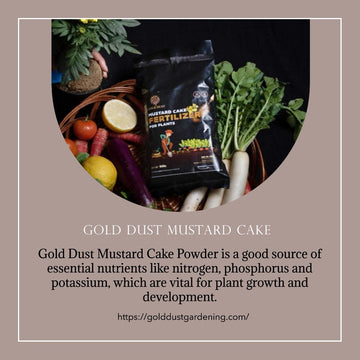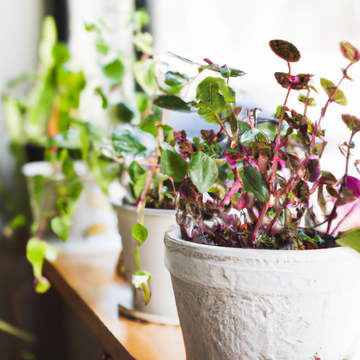The Science Behind Mustard Cake Fertilizer and Its Impact on Plant Growth
by Saru Kaushish on Feb 09, 2023

Organic fertilisers have become increasingly popular in modern agriculture due to the various benefits they offer over synthetic fertilisers. Organic fertilisers provide nutrients to the soil in a slow-release manner, promoting long-term soil health and reducing the risk of nutrient leaching. Unlike synthetic fertilisers, organic fertilisers do not harm soil microorganisms, which are crucial in maintaining soil fertility.
Mustard cake is one of these organic fertilisers, which has gained a lot of attention in recent years.
Mustard cake fertiliser is an organic fertiliser made from the residue left after extracting oil from mustard seeds. It is also known as mustard meal or mustard seed cake. It is an excellent source of essential nutrients and a potent biofertiliser.

Composition and Nutrients of Mustard Cake Fertilizer
Mustard cake fertiliser is a rich source of essential nutrients required for plant growth, including nitrogen, phosphorus, potassium, sulphur, calcium, and magnesium. It also contains micronutrients such as iron, manganese, zinc, and copper.
It is an organic matter which contains 40-50% protein, 15-20% oil, 12-14% crude fibre, and 7-8% ash. Its low carbon-to-nitrogen ratio makes it a good source of nitrogen for plants.
Mustard cake fertiliser for flowering plants is a better alternative to synthetic fertilisers as it is economical, eco-friendly, and has no adverse effects on the environment or human health. It also provides a broader range of nutrients than most synthetic fertilisers.
Impact of Mustard Cake Fertilizer on Soil Health and Plant Growth
Mustard cake is an organic fertiliser that has shown promising results in improving soil health and promoting plant growth. Its application can enhance soil structure and fertility, promote root growth and seed germination, and boost vegetative growth and crop yield.
Improving Soil Structure and Fertility
Applying fertiliser for flowering plants to the soil can improve soil structure and fertility. It enhances , aeration,porosity, and water holding capacity of the soil which is essential for root growth and nutrient absorption. It also increases soil organic matter, which promotes beneficial microbial activity in the soil.
Promoting Root Growth and Seed Germination
It contains plant growth-promoting hormones such as auxins, gibberellins, and cytokinin that promote root growth and seed germination. These hormones stimulate the growth of lateral roots and root hairs, which increase the surface area for nutrient absorption.
Boosting Vegetative Growth and Crop Yield
Mustard cake for plants provides a steady supply of essential nutrients required for vegetative growth and crop yield. It enhances photosynthesis, increases chlorophyll content, and promotes plant growth and development.
Mechanism of Action of Mustard Cake Fertilizer
Mustard cake fertiliser contains enzymes and beneficial microorganisms that promote soil health and nutrient availability. These enzymes break down complex organic matter into simple compounds, making them available for plants. Beneficial microorganisms such as nitrogen-fixing bacteria, phosphate-solubilising bacteria, and mycorrhizal fungi colonise the soil, enhancing plant nutrient uptake.
Mustard fertiliser has a slow-release mechanism, which releases nutrients gradually over time, providing a sustained source of nutrients for plant growth. It also has a high cation exchange capacity, which means it can hold nutrients in the soil, making them available to the plants for extended periods. The slow release of nutrients also helps prevent nutrient leaching, reducing the risk of groundwater contamination.
Dosage and Application of Mustard Cake Fertilizer in an 8 Inch Pot
To use mustard cake in an 8-inch pot, the dosage and application method need to be carefully considered. Typically, one tablespoon of mustard cake per plant is enough for a pot of this size. The cake should be mixed into the soil, ideally at the time of planting, or added as a top dressing once a month during the growing season.
Before using mustard cake, it is important to soak it in water for at least 24 hours. This helps to break down the proteins and make the nutrients more readily available for the plants. The soaked cake can then be mixed into the potting soil or applied as a top dressing around the base of the plant.
It is important to note that using too much mustard cake can lead to nitrogen burn, which can damage or kill the plant. Therefore, it is essential to follow the recommended dosage and not exceed it. Additionally, mustard cake should not be used on plants that are sensitive to high levels of nitrogen, such as succulents and cacti.
Benefits of Mustard Cake Fertilizer
Mustard fertiliser provides a range of benefits that can help promote sustainable agriculture practices. These benefits include:
Improving Crop Yield and Promoting Sustainable Agriculture
The use of it can improve crop yield and promote sustainable agriculture. It provides a broad range of essential nutrients required for plant growth and promotes soil health, reducing the need for synthetic fertilisers. The slow-release mechanism of nutrients also ensures sustained plant growth, reducing the need for frequent fertilisation.
Reducing Chemical Fertiliser Usage and its Negative Effects on Certain Plants
It can reduce the use of chemical fertilisers, which negatively affect the environment and certain plants. Synthetic fertilisers can lead to soil acidification, eutrophication, and groundwater contamination. They can also negatively affect certain plants, such as legumes requiring specific soil conditions to fix nitrogen.
Limitations in Acidic Soil and Risk of Contamination
Mustard cake fertiliser is not recommended in acidic soils as it can further acidify the soil. It also contains glucosinolates, which can release toxic compounds in the soil, posing a risk of contamination. Following recommended dosages and application methods is essential to avoid overuse and potential contamination.
Conclusion
It provides a broad range of essential nutrients required for plant growth. It is essential to follow recommended dosages and application methods and avoid overuse to prevent potential contamination. Using mustard cake fertiliser can promote sustainable agriculture and create a healthier environment for future generations.
Looking for a high-quality source of organic fertiliser to promote healthy plant growth? Check out the selection of natural and sustainable fertilisers available at Gold Dust Gardening. They offer a range of options, including mustard cake for plants, which can help reduce your reliance on synthetic fertilisers, promote sustainable agriculture, and contribute to a healthier environment.




